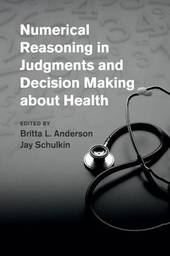
|
Numerical Reasoning in Judgments and Decision Making about Health
Paperback / softback
Main Details
| Title |
Numerical Reasoning in Judgments and Decision Making about Health
|
| Authors and Contributors |
Edited by Britta L. Anderson
|
|
Edited by Jay Schulkin
|
| Physical Properties |
| Format:Paperback / softback | | Pages:330 | | Dimensions(mm): Height 230,Width 152 |
|
| ISBN/Barcode |
9781107612587
|
| Classifications | Dewey:153.83 |
|---|
| Audience | | Professional & Vocational | | Tertiary Education (US: College) | |
|---|
| Illustrations |
21 Tables, black and white; 25 Line drawings, black and white
|
|
Publishing Details |
| Publisher |
Cambridge University Press
|
| Imprint |
Cambridge University Press
|
| Publication Date |
28 July 2016 |
| Publication Country |
United Kingdom
|
Description
Every day thousands of individuals need to make critical decisions about their health based on numerical information, yet recent surveys have found that over half the population of the United States is unable to complete basic math problems. How does this lack of numerical ability (also referred to as low numeracy, quantitative illiteracy or statistical illiteracy) impact healthcare? What can be done to help people with low numeracy skills? Numerical Reasoning in Judgments and Decision Making about Health addresses these questions by examining and explaining the impact of quantitative illiteracy on healthcare and in specific healthcare contexts, and discussing what can be done to reduce these healthcare disparities. This book will be a useful resource for professionals in many health fields including academics, policy makers, physicians and other healthcare providers.
Author Biography
Britta L. Anderson is a Research Associate at the American College of Obstetricians and Gynecologists. Jay Schulkin is the Senior Director of Research in the Division of Practice at the American College of Obstetricians and Gynecologists. He is also a Research Professor of Neuroscience at Georgetown University, Washington DC and Research Professor in the Department of Obstetrics and Gynecology at the University of Washington.
Reviews'This topic is highly relevant to efforts at improving the application of evidence-based medicine, as well as patient adherence and patient empowerment through collaborative decision-making. Teaching physicians about numeracy and providing them with practical ways of enhancing patient numeracy are also extremely useful contributions to the literature.' Charles J. Lockwood, The Ohio State University College of Medicine 'This book now stands as the definitive collection of thinking - both theoretical and applied - on the relationship between numerical reasoning and medical decision-making. A marvellous collection of chapters, each of which stand strong on their own, but that also come together as more than the sum (I had to make a math reference!) of their parts.' Peter A. Ubel, Duke University, North Carolina
|